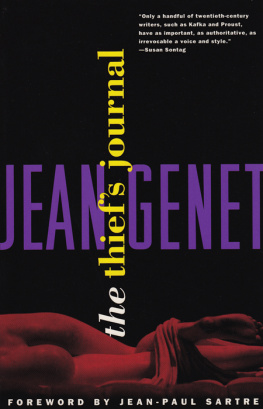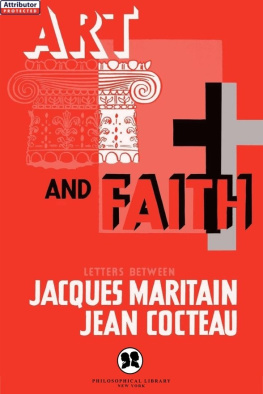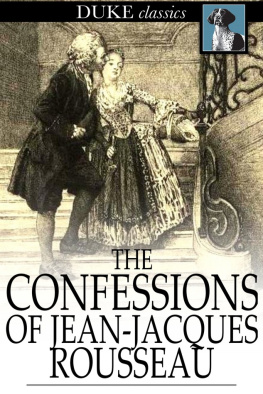The Thief's Journal
OTHER WORKS BY JEAN GENET
The Balcony
The Blacks
Funeral Rites
The Maids and Deathwatch
The Miracle of the Rose
Our Lady of the Flowers
Querelle
The Screens
The Thief's Journal
by Jean Genet
F OREWORD BY J EAN -P AUL S ARTRE
T RANSLATED FROM THE F RENCH BY
B ERNARD F RECHTMAN
GROVE PRESS
New York
Copyright 1964 by Grove Press, Inc.
All rights reserved. No part of this book may be reproduced in any form or by any electronic or mechanical means, including information storage and retrieval systems, without permission in writing from the publisher, except by a reviewer, who may quote brief passages in a review. Any members of educational institutions wishing to photocopy part or all of the work for classroom use, or publishers who would like to obtain permission to include the work in an anthology, should send their inquiries to Grove/Atlantic, Inc., 841 Broadway, New York, NY 10003.
Originally published by Librairie Gallimard in Paris, France, under the title Journal du Voleur, copyright 1949 by Librairie Gallimard.
Printed in the United States of America
Library of Congress Cataloging-in-Publication Data
Genet, Jean, 1910
The thief's journal.
Translation of: Journal du voleur.
I. Title
PQ2613.E53J6131987843.91287-12095
ISBN 9780802194251
Grove Press
841 Broadway
New York, NY 10003
99 00 0115 14 13 12 11 10 9 8
SARTRE
au CASTOR
FOREWORD
Not all who would be are Narcissus. Many who lean over the water see only a vague human figure. Genet sees himself everywhere; the dullest surfaces reflect his image; even in others he perceives himself, thereby bringing to light their deepest secrets. The disturbing theme of the double, the image, the counterpart, the enemy brother, is found in all his works.
Each of them has the strange property of being both itself and the reflection of itself. Genet brings before us a dense and teeming throng which intrigues us, transports us and changes into Genet beneath Genet's gaze. Hitler appears, talks, lives; he removes his mask: it was Genet. But the little servant girl with the swollen feet who meanwhile was burying her childthat was Genet too. In The Thief's Journal the myth of the double has assumed its most reassuring, most common, most natural form. Here Genet speaks of Genet without intermediary. He talks of his life, of his wretchedness and glory, of his loves; he tells the story of his thoughts. One might think that, like Montaigne, he is going to draw a good-humored and familiar self portrait. But Genet is never familiar, even with himself. He does, to be sure, tell us everything. The whole truth, nothing but the truth, but is it the sacred truth. He opens up one of his myths; he tells us: You're going to see what stuff it's made of, and we find another myth. He reassures us only to disturb us further. His autobiography is not an autobiography; it merely seems like one; it is a sacred cosmogony. His stories are not stories. They excite you and fascinate you; you think he is relating facts and suddenly you realize he is describing rites. If he talks of the wretched beggars of the Barrio Chino, it is only to debate, in lordly style, questions of precedence and etiquette; he is the Saint-Simon of this Court of Miracles. His memories are not memories; they are exact but sacred; he speaks about his life like an evangelist, as a wonder-struck witness. When Edouard, the novelist in Gide's The Counterfeiters, writes the journal of his novel, he is no longer fictitious. But Genet the novelist, speaking of Genet the thief, is more of a thief than the thief; the thief and his double are alike sacred. Thus there comes into being that new object: a mythology of the myth (like the blues song that was called The Birth of the Blues ); behind the first-degree mythsThe Thief, Murder, the Beggar, the Homosexualwe discover the reflective myths: the Poet, the Saint, the Double, Art. Nothing but myths, then; a Genet with a Genet stuffing, like the prunes of Tours. If, however, you are able to see at the seam the thin line separating the enveloping myth from the enveloped myth, you will discover the truth, which is terrifying. That is why I do not fear to call this book, the most beautiful that Genet has written, the Dichtung und Wahrheit of homosexuality.
Jean-Paul Sartre
C onvicts garb is striped pink and white. Though it was at my heart's bidding that I chose the universe wherein I delight, I at least have the power of finding therein the many meanings I wish to find: there is a close relationship between flowers and convicts. The fragility and delicacy of the former are of the same nature as the brutal insensitivity of the latter. So that now the home jails, bloated with evil males, are black with them, as with blood that has been shot through with carbonic gas. (I have written black. The outfit of the convictscaptives, captivity, even prisoners, words too noble to name usforces the word upon me: the outfit is made of brown homespun.) It is toward them that my desire will turn. I am aware that there is often a semblance of the burlesque in the colony or in prison. On the bulky, resonant base of their wooden shoes, the frame of the condemned men is always somewhat shaky. In front of a wheelbarrow, it suddenly breaks up stupidly. In the presence of a guard they bow their heads and hold in their hands the big straw sun bonnetwhich the younger ones decorate (I should prefer it so) with a stolen rose granted by the guardor a brown homespun beret. They strike poses of wretched humility. If they are beaten, something within them must nevertheless stiffen: the coward, the sneak, cowardice, sneakiness arewhen kept in a state of the hardest, purest cowardice and sneakinesshardened by a dousing, as soft iron is hardened by dousing. They persist in servility, despite everything. Though I do not neglect the deformed and misshapen, it is the handsomest criminals whom my tenderness adorns.
Crime, I said to myself, had a long wait before producing such perfect successes as Pilorge and Angel Sun. In order to finish them off (the term is a cruel one!) it was necessary for a host of coincidences to concur: to the beauty of their faces, to the strength and elegance of their bodies there had to be added their taste for crime, the circumstances which make the criminal, the moral vigor capable of accepting such a destiny, and, finally, punishment, its cruelty, the intrinsic quality which enables a criminal to glory in it, and, over all of this, areas of darkness. If the hero join combat with night and conquer it, may shreds of it remain upon him! The same hesitation, the same crystallization of happy circumstances governs the success of a pure sleuth. I cherish them both. But if I love their crime, it is for the punishment it involves, the penalty (for I cannot suppose that they have not anticipated it. One of them, the former boxer Ledoux, answered the inspectors smilingly: My crimes? It's before committing them that I might have regretted them") in which I want to accompany them so that, come what may, my love may be filled to overflowing.
I do not want to conceal in this journal the other reasons which made me a thief, the simplest being the need to eat, though revolt, bitterness, anger or any similar sentiment never entered into my choice. With fanatical care, jealous care, I prepared for my adventure as one arranges a couch or a room for love; I was hot for crime.
My excitement is the oscillation from one to the other.








